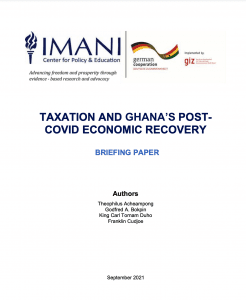Tax revenue generation remains one of the most central activities of any nation-state. The state collects taxes and efficiently redistributes the resources as part of its allocation function. However, since independence, Ghana has struggled to collect enough taxes relative to the size of its economy. In this briefing paper, we examine ways that Ghana can use tax policy to increase revenues while also supporting business growth and industry competitiveness, especially in a Ghana Beyond Aid and post-COVID context. Our analysis focuses on a historical examination of Ghana’s economy and tax structures, assessment of the initial tax policy response to the COVID-19 pandemic, and the role of tax policy in supporting recovery from the pandemic.
The findings are as follows
1. While Ghana’s economy has recorded modest growth over the past two decades, there has not been
commensurate improvement or aggressive measures to collect more taxes or close the loopholes.
2. The current structure of Ghana’s economy reflects a large degree of informality, which poses significant
challenges in terms of tax collection. The informal economy is about 38% of GDP, while over 80% to
90% of the workforce is in the informal sector.
3. Ghana’s tax effort measured by the tax-to-GDP ratio currently stands at less than 14%. In comparison,
peer African countries are between 17% to 20%. The Ghana Revenue Authority (GRA’s) Strategic Plan
targets a tax-to-GDP ratio of 17.5% within 3 years ending 2022.
4. The highest share of tax revenues in Ghana comes from taxes on goods & services other than value-
added taxes (VAT). This is followed by VAT. Non-tax revenues are the least and are twice lower than that collected for other peer African countries.
5. Ghana initially introduced some tax policy responses to mitigate the impact of the pandemic on
businesses in 2020. However, these were subsequently followed by new tax measures — such as the
COVID-19 Levy, Financial Sector Clean-up Levy, Energy Sector Recovery Levy, Sanitation and Pollution
Levy — to close the fiscal gaps created by the pandemic. These new taxes are highly likely to increase
the cost of production for businesses.
6. The increasing burden of taxation continues to be a major issue of concern for captains of industries, as
reflected by the results of multiple studies.
7. The prospects for Ghana’s post-COVID recovery remains high; however, they are strongly dependent on
the effectiveness of policies to improve the business climate.
Recommendations
1. Parliament must urgently pass the Tax Exemptions Bill, which has been pending before the House since
2019. This will help streamline Ghana’s tax exemptions regime and minimise abuse.
2. The inequality worsening effect of the pandemic strongly calls for a just, equitable, and functioning tax
system. This beckons for a more progressive tax structure underpinned by an efficient administrative
system
3. Government must aggressively pursue its digitalisation drive, but back this up by educating businesses
and citizens. Pursuing diversification and digitalisation to improve tax collection could add another 6% of
GDP (USD4 billion or GHS24 billion) per annum opportunity, enough to build several schools, roads,
hospitals, and other critical national infrastructure.
4. Scale-up revenue mobilisation from VIPs, High Net Worth and Ultra High Net Worth Individuals in the
country
5. Ghana must aggressively work on increasing non-tax revenues by monetising indiscipline in the society
by increasing fines, penalties and forfeitures, property taxes, among others.
Read Full Report
IMANI Center for Policy & Education is a Think Tank of considerable local and international repute based in Ghana. Founded on the 9th of March 2004, IMANI has carved a niche in Ghana’s policy environment for putting out objective, independent analysis and critique on many issues, using tried and tested techniques that apply across different disciplines.
Photo Credit: Unsplash Creative.


